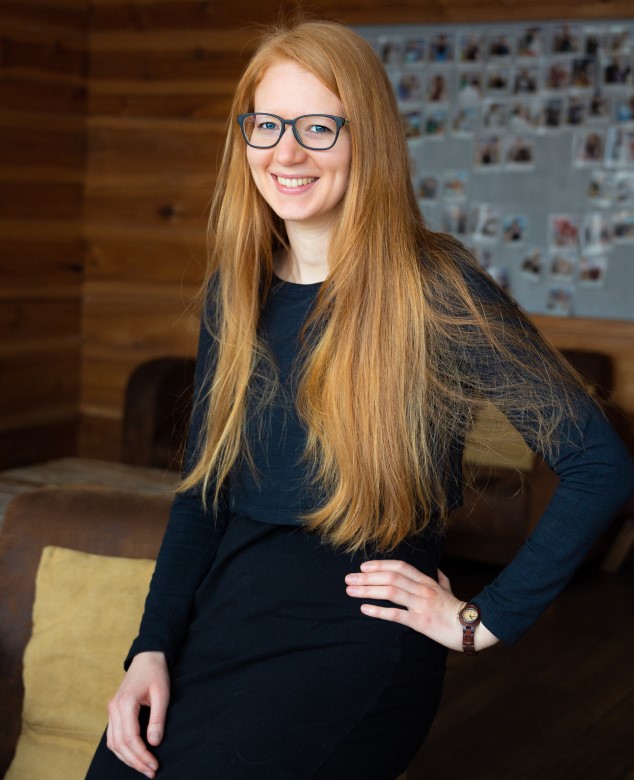In the series “Job Profiles”, we talk to various members of the InterNations team about their position and the work they do.
In this post, we’d like to introduce Lisa, who is part of the Human Resources Team at our Munich office.

Can you tell me about your background and how you came to work for InterNations?
I started working here a little over two years ago, as an HR trainee — even though I didn’t actually have a background in HR.
I graduated with a bachelor’s degree in English studies and political science and then completed an internship at Deutsche Post DHL Group in Bonn. There I worked in corporate communications, helping to spread the word about corporate social responsibility topics, especially their Go Green program. It’s all about reducing CO2 emissions and investing in climate action projects.
I started looking for a regular job while working on my master’s degree — I’d enrolled in a course on international management and business communication in Edinburgh. Although my post-grad degree included a couple of classes on HR management and the like, I wasn’t specifically planning a career in HR.
It was more or less by accident that I found InterNations. While living in Scotland, I made fast friends with another student who has a very international background. She’d grown up in Turkey and has lived in Italy, Spain, Belgium, and the UK as an adult. She was already an InterNations member and recommended it to me. She said it might be an interesting networking opportunity.
So, I first joined InterNations as a member; some time later, I discovered the career pages while exploring the site. There were several vacancies for entry-level jobs I could apply for — and here I am.
I’ve recently been promoted from junior employee to HR manager, just in time for my birthday. Me and my team, we opened a bottle of sparkling wine to celebrate: we should always start our work week that way!

You work for the world’s largest expat community, but you are currently not an expat yourself. What makes you a global mind?
Well, I’ve always enjoyed the international aspects of my work and education the most. During my bachelor’s degree, I spent an academic year abroad in northwest Minnesota. It really opened the door to a wider world for me: we were a close-knit community of visiting students, and it was the perfect opportunity to meet interesting people from around the globe.
At my German university, I volunteered as a “buddy” for international students, helping them to settle in and learn all about everyday life in Germany. We’d aid them in finding a room, explain how to get a local SIM card for their phone, or offer them to spend Christmas with us, things like that. I became close friends with two Taiwanese students that way. Thanks to them, I got to spend a five-week vacation in Taiwan and became interested in learning Chinese. Therefore, I even took some Mandarin classes during my master’s degree.
One of the things I liked best about my internship at Deutsche Post DHL Group was being part of an international team, with co-workers from China, Mexico, the UK, for example. That’s also why InterNations as a potential employer left such a strong impression: both its mission and the prospect of working in another multinational team really appealed to me.

Which tasks does your job as an HR manager usually involve?
About half of my job consists of recruiting, mostly dealing with incoming applications.
First, I screen all applications to see if they fit the job profile and meet our formal requirements. For some jobs, the latter are obviously a lot stricter: if someone applies as a copywriter rather than a frontend developer, we’ll pay much closer attention to spelling, grammar, etc. Even so, you’d be surprised how many people confuse a cover letter with a letter of reference and send us the wrong document!
Job hunting is kind of like dating. Hiring managers are as different from each other as the candidates who apply for the position. Some may find certain skills essential, while others might not consider them important.
I forward promising applications to the hiring manager — usually the team lead or head of department — and get in touch with the short-listed candidates. Basically, I handle all email communication, send them tasks to complete (e.g. testing their written English skills), and set up interviews. I also conduct some of the initial interviews, while the hiring manager usually takes over any follow-ups if a second round of interviews should be necessary.
Once somebody has accepted our job offer, I’m responsible for the onboarding process: issuing their contract, sending them information about InterNations and Munich, officially introducing them on our intranet, and so on. Together with our office managers, we’ve also created a branded welcome packages, with an InterNations t-shirt, hoodie, water bottle, and stationary, so that new employees feel like part of the team right away.
What has the HR Team been working on lately?
Last year’s big project was establishing a brand-new feedback process for the InterNations Team. While employees still have personal feedback talks with their direct supervisors, we’ve also introduced a collaborative format: the Personal Development Conferences (PDCs) and Leadership Conferences (LCs).
During the PDCs, employees in leadership positions take part in a moderated discussion about their team members’ performance, potential, and possible development opportunities; in an LC meeting, the team members themselves give joint feedback on their supervisors’ leadership skills.
At first, I was a bit skeptical about the collective aspect, but I’ve been converted, so to speak. It’s a huge benefit for everyone: The PDC encourages leaders to think about development options for their employees. They also have to back up their evaluation with specific examples, as they might be challenged by their peers. And the LCs give all regular employees the chance to have their input heard and to improve cooperation with the team lead, as well as within the team. Having this platform also makes people feel for comfortable with discussing those areas where there’s room for improvement.
For our 2019 project, we’ll be producing two employer-branding videos, for example for IT recruiting. We have just begun to brainstorm potential storylines and angles for this campaign, and I’m already excited about it: I haven’t been part of any video shoots yet, so it’ll be something completely different.

Which achievements at work are you especially proud of?
I do consider being a co-moderator for the PDCs and LCs a huge sign of trust, as the discussions may involve sensitive topics or confidential information. Moderating a discussion round is also not as easy as it might seem. We did have a training to prepare us, but that was only one session, and in the end, you just have to go for “learning by doing”.
Especially during the Leadership Conferences, where you had all sorts of employees participating, from people in entry-level positions to more senior team members, I had to get a feeling for when to intervene and when to let the conversation flow naturally. I needed to figure out when to interrupt with follow-up questions and how to best ask team members to clarify, give additional examples, or be more specific. Sometimes, the feedback given wasn’t according to our rules, and this obviously needed pointing out. But how do you bring it up while still keeping the atmosphere friendly and cooperative?
It has definitely become easier, though. It’s been quite the learning curve for me.
Are there any aspects of your job that you don’t like so much? Why?
I wish there were more learning and development opportunities specifically aimed at the HR Team. Since we are a rather small team, it’s harder to get our particular needs addressed. For example, I’d like to learn more about German labor law or those parts of immigration law related to work and residence permits. I’d also like to further develop my moderation skills.
Moreover, I’d prefer working in a nicer neighborhood than the one close to Munich main railway station. Unfortunately, we will not be moving to a different location anytime soon — but I’m looking forward to our new office design, which is currently being worked on!

What are the benefits and challenges of recruiting internationally?
The difficulties are mostly practical in nature. It clearly makes some aspects of recruiting more difficult: Plenty of applicants live abroad, so on-site interviews or in-person meetings are hard or impossible to organize. We have to work around different time zones or technical issues. Generally, it’s more difficult to really get to know the candidates.
Of course, there are always legal issues involved when you need a work permit for someone from outside the EU. However, that’s mainly time-consuming for the employees themselves, who spend a lot of time talking to people at the Ausländerbehörde (local immigration office). This is one reason why I wish I had more in-depth knowledge of German immigration law.
I think the benefits outweigh the disadvantages, though. We have a much larger pool of applicants than if we just recruited people who already live in Germany. Considering the services we offer as a company, we simply need an international team — employees who are expats themselves and have a lot in common with our members. Their perspective on living and working abroad is invaluable.
Last but not least, it’s an enriching experience to have people from all over the world working for us and with us.

Why should someone apply for a job at InterNations?
While we’re no longer considered a start-up, we still have many traits that are typical of young, up-and-coming companies, like pretty flat hierarchies: junior employees can voice their opinions freely and bring their ideas to the table. It’s also valuable for their more experienced co-workers and team leads if “newbies” are confident enough to speak up and share their views.
In general, we have a very relaxed company culture — casual, extroverted, and sociable. And our employees have a lot of independence and responsibility, even in junior positions. If this appeals to you, you’ll fit right in!
Photo credits: InterNations / iStockphoto